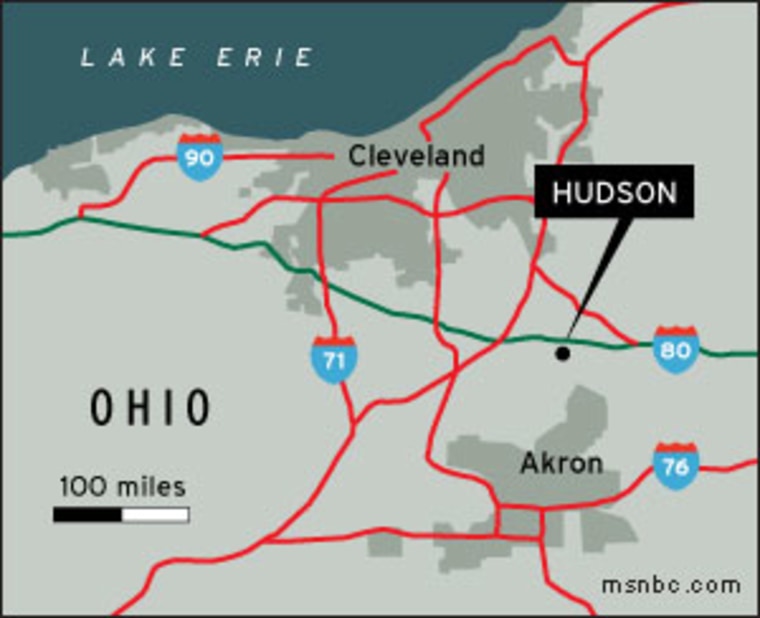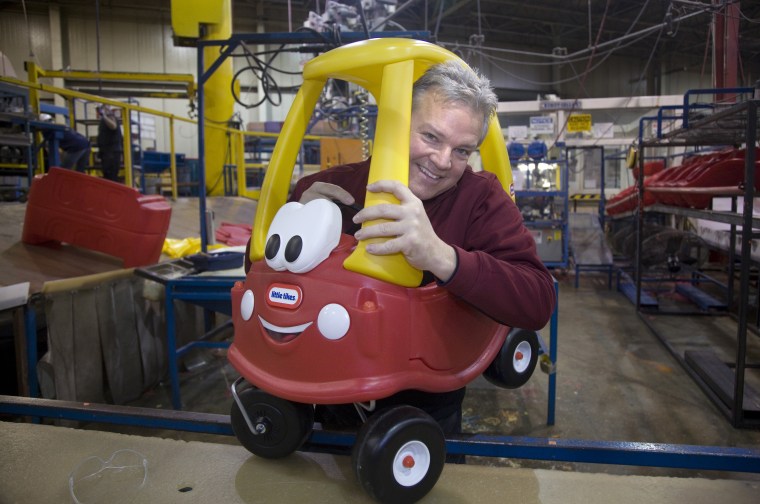With its iconic shape and familiar red and yellow plastic parts, the toddler-powered Cozy Coupe seems like the most ordinary thing in the world.
But it’s among the most unusual items in the toy industry today: a product made in America.
The Commerce Department estimates that 95 percent of the nearly $23 billion worth of toys sold in America in 2007 were imported, mostly from China, according to the latest industry report available. That's up from 85 percent just four years earlier.
The reason is simple. Workers in China and other, less developed countries will do the often labor-intensive job of making dolls, cars and other products for vastly lower wages than American workers can afford.
Cozy Coupe maker Little Tikes, which focuses on products for the birth to 5-year-old set, hasn’t been immune to the trend. Some of its products, including smaller plastic toys and those with electronic components, are made overseas.
Still, it continues to churn out around 230 different brightly colored plastic products each year — including half a million Cozy Coupes — at its plant in the small town of Hudson, Ohio, southeast of Cleveland. Other products made at the plant include climbers, beds, tables and swings.
Selling products carrying a "Made in U.S.A." sticker has given the company a marketing advantage, especially after the 9/11 terrorist attacks and again during the recent recession.
“When America is in tough times, we do bond together,” said Tom Richmond, Little Tikes’ general manager.
But while the company does point out — with pride — its commitment to U.S. manufacturing, it is careful not to deride products that are made in China and elsewhere.
“We never use ‘made in America’ in a negative way, to sell against something,” Richmond said
Advantages to U.S. production
Little Tikes isn't making toys in the United States for purely patriotic reasons.
In Hudson, the company mainly produces the kind of bulky plastic products that would be cost-prohibitive to ship from overseas. It also uses highly specialized equipment that allows it to produce its big toys with relatively few workers. Only about 500 people work at the Hudson facility, including executives, designers, engineers and factory workers.
Still, the company's future in Ohio was far from assured until recently, when it sealed a deal for more than $4 million in government loans, grants and tax credits to keep and create new manufacturing jobs in Hudson.
The news came as the company was enjoying somewhat of a renaissance for the Cozy Coupe, prompted in part by a major redesign to coincide with the toy's 30th anniversary last year.
Little Tikes sold 509,000 Cozy Coupes in 2009, an 11 percent increase over 2008 and a massive increase over the 115,000 units sold in 2007. About 60 percent of 2009 sales were of the traditional red and yellow model, with the remainder coming from the pink Princess and fire engine-themed Ride & Rescue models.
Having a U.S. manufacturing facility allows Little Tikes employees a rare luxury in industry today: the ability to see a product through from the designer’s rough sketch to the finished product right in the same building. Richmond says the fact that the manufacturing operation is just steps from his office makes it easier for the company to quickly respond to the latest fads, or to make a small batch of a specialized toy.
Still, in a business where executives are under intense pressure to shave even pennies off production costs, Little Tikes’ Hudson plant is constantly looking for ways to make toys more efficiently. Richmond said the company has reduced employment over the years and is constantly assessing what is more cost-effective: automation or manual labor.
Amid the hulking machines that twirl and cook the plastic parts that go into the Cozy Coupe, a robot has replaced humans for the job of drilling holes in plastic parts.
Elsewhere on the sprawling factory floor, however, workers still hand-pour resin into toy molds and manually shave off the raw edges of newly completed parts.
“Our process is pretty labor-intensive and we’re still able to compete,” Richmond said.
Recent decision to stay in Hudson
This small corner of northeast Ohio is something of a toymaking hub.

Little Tikes, since 2006 a unit of privately held MGA Entertainment, has been making toys in the area for four decades. In the early 1990s, Little Tikes founder Thomas Murdough Jr. also started a competing toymaker called Step2 in nearby Streetsboro, Ohio. Step2 makes makes products including plastic playhouses, furniture, wagons and ride-on toys at factories in Streetsboro and Perrysville, Ohio.
Late last year, the company agreed to stay in Hudson after years of discussions with the state, city and county governments, as well as flirtations with competing areas in the United States and Mexico.
As part of the deal, Little Tikes accepted a $3.2 million low-interest loan from the state of Ohio to invest in machinery and equipment, said Chuck Wiedie, economic development director for the city of Hudson.
The state also gave Little Tikes a $300,000 grant, which the city matched, as well as another $125,000 workforce training grant, Wiedie said. The company also received a state job creation tax credit valued at around $200,000, and a city job creation tax credit valued at around $78,000, Wiedie said.
In return, Wiedie said Little Tikes pledged to create at least 66 new jobs and to keep its manufacturing operations in the area for at least 14 years.
The company also promised to bring some products that were being made in China back to the United States. One of the first products to be reintroduced to the Hudson plant was a swing. On a recent day, stacks of the shiny blue swings were sitting in the factory, waiting to be sold.
Hudson has other large employers, such as a Jo-Ann Fabrics & Craft Stores corporate headquarters and a regional Allstate Insurance headquarters. But Wiedie said it was a top priority to keep Little Tikes from being lured away.
“It’s keeping manufacturing jobs in northeast Ohio and in specific in the city of Hudson,” Wiedie said.
The deal was a victory for Hudson, but toy analyst Sean McGowan with Needham & Co. said it’s unlikely to portent a trend.
“It continues to be advantageous to manufacture things outside the U.S.,” McGowan said.
Manufacturing wages per employee in China are around $3,000 at the current exchange rate, compared to overall U.S. manufacturing wages per employee of $55,000, according to Mark Zandi, chief economist with Moody's Economy.com. The U.S. number is much higher in part because it inclues wages of people who do more sophisticated factory work, such as high-tech manufacturing.
Although the cost of labor has gone up in China in recent years, McGowan said China now is also able to do the more high-end work, such as engineering and designing, for a much lower cost than in the United States.
Also, even as workers in China demand higher salaries, other, less developed countries such as Vietnam and Cambodia will continue to offer cheaper labor.
If a company does decide to manufacture a toy in the United States, McGowan said it tends to be because they can do the type of efficient work here that requires few workers.
“Whatever the tide does, it’s not going to move a lot of jobs back, and it’s not going to create a lot of jobs,” he said.
Relief for suppliers
In Hudson, however, Little Tikes' decision to stay did likely provide some relief to a host of area suppliers who provide everything from machine parts to boxes for Little Tikes. One of those is Packaging Corporation of America, which manufactures packaging products at 69 U.S. factories, including one in Newark, Ohio, that serves Little Tikes.
David Mead, Packaging Corporation of America’s general manager of national accounts, said Little Tikes’ close proximity allows the two companies to work more collaboratively on everything from design to cost-cutting strategies.
Such proximity came in handy recently, when Little Tikes launched the major redesign of the Cozy Coupe.
The impetus for the change was exceedingly practical: Wal-Mart, one of the company’s major retail partners, wanted a smaller box for its shelves, said Tom Fish, Little Tikes’ senior director of product development.
In the end, Fish said the redesigned product — which now has cartoonish eyes, cup holders and a handle that parents can use to push tired tots — also ended up helping to revitalize interest in the Cozy Coupe.
Mead said packaging company executives were able to sit in on meetings about the redesign and smaller box from the beginning. Although the packaging firm has an office in Hong Kong and works with companies that manufacture overseas, Mead said there’s something nice about working with one of the few major toy companies still manufacturing in America.
“As you drive around neighborhoods in America, you look in back yards … and every once in a while you see a Cozy Coupe and, you know, it just feels really good to know that you’re involved in packaging an American product with an American company shipping in the heartland of Ohio,” Mead said.
